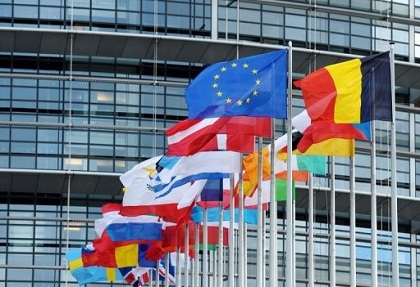EU Ready to Help but Urges Lebanon to 'Deliver on Reforms'

The EU announced Wednesday that it will “assist Lebanon in economic recovery” but added that “the Government of Lebanon must commit and deliver on reforms.”
The announcement was made as the European Union and the World Food Program joined forces to support vulnerable populations in Lebanon.
“Through the EU Regional Trust Fund in Response to the Syrian Crisis, the Madad Fund, the European Union is working in partnership with the World Food Program (WFP) to support vulnerable households in Lebanon, affected by the multiple crises confronting the country,” the EU Delegation to Lebanon said in a statement.
“With a total budget of €151.2 million in grants, which includes a new EU-WFP agreement worth €103.2 million signed this September, their assistance provides a critical lifeline to vulnerable Lebanese and refugees from Syria struggling to meet their basic needs,” it added.
EU Commissioner for Neighborhood and Enlargement, Olivér Várhelyi, commented: “The economic and financial downturn, the COVID-19 pandemic and most recently, the explosions at the port of Beirut, have left thousands of families with no access to livelihoods, no assets and no adequate social protection. The European Union continues to stand with the people of Lebanon during these challenging times.”
“Together with our partner WFP, we support strengthening the national social assistance systems and making them more effective, accountable and transparent. The EU will assist Lebanon in economic recovery, but the Government of Lebanon must commit and deliver on reforms,” Várhelyi added.
WFP Executive Director David Beasley for his part said that “this generous contribution from the EU is coming at a critical time when so many people in Lebanon are struggling to make ends meet.”
“Thanks to the EU’s vital support, WFP will continue covering both the immediate and longer-term needs of the most vulnerable people across the country -- bringing some hope and normality back to their lives. Our partnership is a great example of how humanitarian and development assistance, offered together, can really save lives and change lives in Lebanon,” he added.
“The recently signed new agreement brings the overall budget of our joint support up to €151.2 million and makes the EU and its Member States the biggest contributor to social assistance in Lebanon. Of the total €151.2 million, up to €10 million are specifically earmarked for populations affected by the economic crisis, who suffered in the wake of the Beirut explosions on 4 August,” Beasley went on to say.
He noted that the devastating blasts exposed residents of greater Beirut to injury and increased vulnerability due to the physical damage, the destruction of their dwellings, the loss of livelihoods, and the spike in COVID-19 cases combined with the diminished capacity of the health system.
“Up to 37,000 of the most vulnerable households will benefit from multi-purpose cash transfers for up to six months through the EU Trust Fund,” Beasley said.
He added: “Beyond the emergency response, the project also aims to strengthen the national social assistance system. A significant amount is allocated to build its capacity, effectiveness and accountability; and to scale up the National Poverty Targeting Program food e-card to reach up to 300,000 Lebanese, jointly with other donors.”
Since 2019, the EU has been supporting vulnerable families, both Lebanese and refugees from Syria, and the establishment of a national social assistance system through WFP, with a budget of €48 million.
This new contribution of €103.2 million signed this September “ensures the expansion and extension of this support until February 2022,” the EU Delegation said.
“With an overall budget of €151.2 million, the EU and its Member States are the biggest contributor to social assistance in Lebanon, both in terms of delivering assistance as well as building the national social assistance system,” it noted.
Sad! Corruptions wins over the massacre of a country for personal benefits. It is like putting civilians as a shield to protect a criminal mafia, or taking civilians hostage and threatening to kill them unless a ransom is paid to the mafia political class...
Not a single $ (or whatever currency) in cash as over 50% of it will disappear even before it gets to the banks.
Only actual materials, although even here there is a good change that a large portion will reach hands not intended to benefit from it.
Everything coming into Lebanon should be watched very careful by on the spot international supervision.



